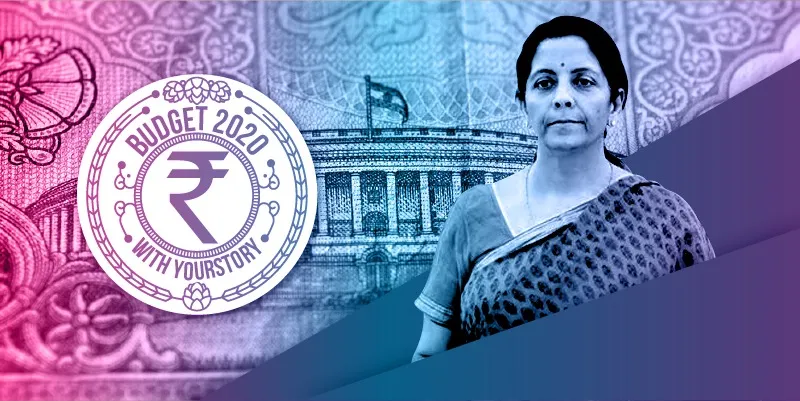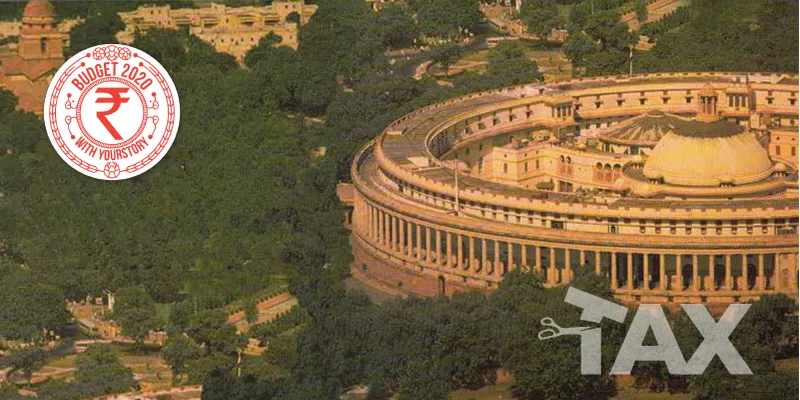Budget 2020: FM woos middle class with lower income tax rates, but there's a catch
The government has slashed income tax rates across the board and proposed a new (but optional) tax regime in the Union Budget 2020. Here's what it means for the salaried middle class.
One of the highlights of Finance Minister Nirmala Sitharaman's nearly three-hour-long budget speech today was the income tax announcements.
It has left both experts and the common man a tad bemused. Drastic changes have been recommended by the FM starting in 2020-21 fiscal.
The government has proposed a new (optional) tax regime with revised slabs, but there is a catch. Those opting for the new rates will have to forego tax-saving exemptions such as long-term investments, LIC policies, house rent allowances, travel allowances, and more.

Image: YS Design
The FM said in her speech, "The new tax regime shall be optional for the taxpayers. An individual, who is currently availing more deductions and exemption under the Income Tax Act may choose to avail them and continue to pay tax in the old regime."
While calling for the "simplification" of the income tax system, she highlighted that 70 exemptions and deductions out of the existing 100+ will be removed from the Income Tax Act going ahead.
"We will review and rationalise the remaining exemptions and deductions in the coming years with a view to further simplifying the tax system and lowering the tax rate," Sitharaman said.
Revised income tax slabs / rates
In order to provide "significant relief" to individual taxpayers, the government has slashed tax rates across income brackets. The new slabs are as follows:
- Those earning up to Rs 5 lakh are exempted from income tax
- Those earning between Rs 5 lakh and Rs 7.5 lakh, will pay a tax of 10 percent (reduced from 20 percent)
- Those earning between Rs 7.5 lakh and Rs 10 lakh, will pay a tax of 15 percent (reduced from 20 percent)
- Those earning between Rs 10 lakh and Rs 12.5 lakh, will pay a tax of 20 percent (reduced from 30 percent)
- Those earning between Rs 12.5 lakh and Rs 15 lakh, will pay a tax of 25 percent (reduced from 30 percent)
- Incomes above Rs 15 lakh will continue to be taxed at a rate of 30 percent.

The FM stressed that in the new tax regime, "substantial tax benefit will accrue to a taxpayer" depending upon exemptions and deductions claimed by them.
She explained,
"For example, a person earning Rs 15 lakh in a year and not availing any deductions will pay only Rs 1,95,000 as compared to Rs 2,73,000 in the old regime. Thus, his tax burden shall be reduced by 78,000 in the new regime."
The government revealed that the new personal income tax rates will entail estimated revenue forgone of Rs 40,000 crore per year. At present, 17 percent of government earnings come from income tax collection, according to the Ministry of Finance.
Archit Gupta, Founder and CEO, , said of the revised tax structure:
"With the optional new regime, taxpayers will have to evaluate what works better. Those committed to long-term saving and investing via 80C may be discouraged, and this may likely demotivate taxpayers from tax-saving linked investing."
Simplification of tax-filing process
The FM has proposed adequate measures to simplify the tax-filing process.
"We have initiated measures to pre-fill the income tax return so that an individual who opts for the new regime would need no assistance from an expert to file his return and pay income tax," she said in her speech.
Additionally, Aadhaar-based verification of taxpayers will be introduced to improve tax compliance. “This will identify all those who are trying to game the system," Sitharaman said.
While the ramifications of the new tax proposals will play out in the next few months, observers reckon that most of the changes will add to taxpayers' benefits.
Waman Parkhi, Partner, Indirect Tax, KPMG in India, said:
Citizens charter for tax departments was introduced in the 90s but now it is proposed to be put into the law and would definitely have more impact. Use of technology in improving ease of doing business like faceless appeals would further add to the benefit of taxpayers.
Rajeev Dimri, Partner and Co-Head, Tax, KPMG in India, said:
"Aside this, institution of tax charter in statutes seems to be introduced for direct taxes, this would be helpful for taxpayers to reduce tax harassment by officers and instil confidence in the bigger tax payers. It should be made applicable to indirect taxes as well."
(Edited by Saheli Sen Gupta)










